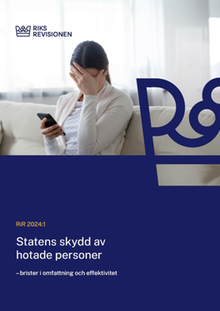Flawed protection of individuals under threat
State efforts to protect individuals under threat are flawed in several different respects. It is recommended that the Government and relevant agencies take measures to improve protection.

Each year, a great number of people in Sweden are subjected to threats, violence and harassment. The Swedish National Audit Office’s audit shows that state efforts to protect these individuals are not sufficiently effective and need to be improved.
“The state neither ensures that everyone in need of protection gets it, nor that the protection granted is sufficiently effective,” comments Auditor General Helena Lindberg.
Part of the problem is that prosecutors very rarely grant non-contact orders if there are no previous convictions for crimes or an ongoing preliminary investigation that is expected to lead to a conviction. At the same time, research shows that non-contact orders are most effective against people who have not previously been arrested for violent crimes.
In addition, the police do not sufficiently monitor non-contact orders, which impairs their ability to detect if the threat to an individual increases, and whether there is need for additional protective measures. Furthermore, violations of non-contact orders rarely lead to consequences for the person under restraint. The situation is further aggravated by the fact that there are such large geographical margins of error in the technology used for electronic surveillance of non-contact orders that it essentially fails to provide any protection.
Within the Swedish Police Authority, the crime victim and witness protection units (BOPS) bear primary responsibility for the protection of individuals under threat. However, BOPS receives a considerable amount of cases, many of which do not need to be processed at BOPS. At the same time, cases in which a threat does exist risk going undetected. The flaws are partly due to the fact that staff who register police reports do not always have sufficient knowledge of which cases should be referred to BOPS.
In recent years, BOPS have also been forced to deal with an increased workload with threats linked to organised crime. This has reduced their capacity for working with domestic violence-related cases. At the same time, BOPS do not systematically follow-up which cases they work with.
“All in all, there is a risk that people who are subjected to domestic violence will not receive adequate protection, especially in metropolitan areas where organised crime is a more widespread problem,” explains Sara Kramers, project leader.
The Swedish NAO also notes that numerous government agencies need to improve their efforts to ensure that they do not divulge protected personal data. Furthermore, the Government needs to grant the Swedish Tax Agency the necessary authority to enable a safe postal service for individuals with protected personal data.
The Swedish NAO also assesses that the state needs to prioritise preventive measures targeting perpetrators to a greater extent. Preventive measures have been shown to successfully prevent repeat offences, especially in cases of domestic violence, stalking and breaches of non-contact orders.
Recommendations in short
The Swedish NAO recommends that the Government initiates amendments to legislation, in order to increase the possibility of issuing non-contact orders against individuals without previous convictions. The Government should also grant the Swedish Tax Agency the authority to scan post addressed to individuals with protected personal data.
Recommendations to the Swedish Police Authority include improving the knowledge of protective measures among employees who register police reports, and procuring technology that enables electronic monitoring of non-contact orders.
Recommendations to the Swedish Prosecution Authority include reinforcing efforts to ensure that legislation on non-contact orders is applied uniformly throughout Sweden.
See the report for the full recommendations.
Press contact: Olle Castelius, phone: +46 8-5171 40 04.
Presskontakt: Olle Castelius , telefon: 08-5171 42 06.
Share in social media and by e-mail
Contact form
Send your questions or comments via the form below and we will make sure that they reach the right member of staff. Please state if your question concerns the information on this particular page.


